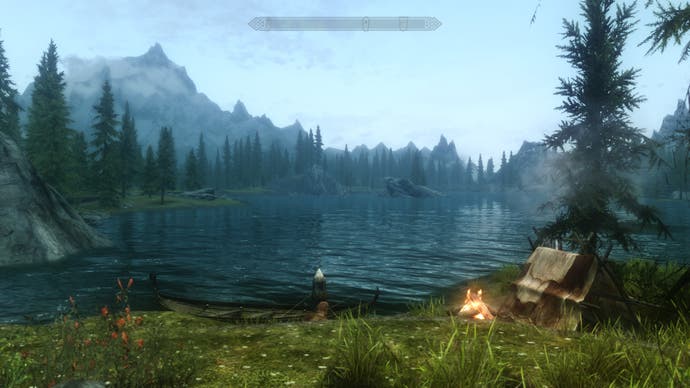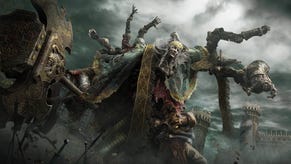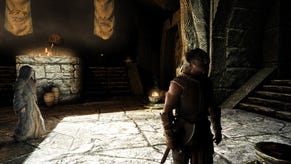Return to Skyrim
Why, over two years on, Bethesda's open world remains as fresh as ever.
How often have you gone back to a game you thought you'd exhausted, only to find it full of prospects and potential? In a fallow period for vast open-world RPGs, a lazy visit to see my Skyrim house opened more than furniture filled with hard-earned goodies. Nostalgia took hold and prompted a look at my open quests list, and from there I was picking up the threads of a game that had laid dormant for a good 18 months.
I had to finish off the Imperials vs Stormcloaks storyline. I felt bad about leaving it (likely due to making sure I'd got all any loot that might be closed off by the war's conclusion), so I felt a curious duty to see it through. Sure enough, ganking up some Stormcloaks outside Whiterun lead to sojourns across Skyrim that put plenty of black location markers on my compass. That was all it took to strike out into the wilds again, if only to tick off all the locations as visited. Such is the power of Skyrim's grip that I was off sneaking my way around new caves and towers, backstabbing all the baddies with joyous abandon. As stealth games, The Elder Scrolls and Fallout titles are a total joy. They're more leisurely than some strict and masochistic Silent Assassin kill or Splinter Cell ghost run, and the system is happy for you to feel comfortable in your state of non-detection while still maintaining enough peril if you step into sight to prevent too much of a farce.
The critical thing was this re-visit showed how much game there really is in vanilla Skyrim. It's a real testament to Bethesda's vision and sheer generosity of content. Aside badgering from infinite dragons, there's little in Skyrim to piss you off, but lots and lots to go and find. And it's still great, over two years after release. It still has the capacity to make you marvel at environmental vignettes that arise from simple exploration, lending a sense of the sublime to idle wandering. It's a place, more so than any of its predecessors, that validates its scale with potential for enjoyment. Perhaps it was a case of absence making the heart grow fonder, but there is a genuine sense that Bethesda built a world intended to be enjoyed as much as possible.
At launch, Skyrim was both a pinnacle for video games and evidence that AAA budgets can still leave room for poor quality control. It claimed a rightful position as the state-of-the-art for freely interactive virtual worlds, but did it with many a glitch, bug and "immersion breaking" script clanger. But those bugbears (or calamitous game-ruining disasters, depending on your luck) don't diminish the achievement - Skyrim offers the greatest freedom and the finest resolution of world we've ever seen in a mainstream videogame. GTA 5, for all its gloss and swagger, still can't let you pick up an apple, let alone shoplift the contents of an entire shop by putting a basket over the keeper's head. That jape, discovered early on in the game's life, evidences Skyrim's chief mandate - to explore what you can do and what you can (or want) to be.
This is perhaps the most important value of video games as a media distinct from all the others. It's inviting you to explore a rich land on your own terms, and makes huge allowances to let you find and define your own way. In this context, Skyrim represents the last great landmark in a three-decade march of truly great games that transcended their peers. All the way from 3D Monster Maze, via Elite and Mercenary to Ultima Underworld and the original TES games, Skyrim is, perhaps, the finest expression of video games fulfilling their true (and unique) potential that I can think of. And that's coming from a Fallout fan that hates goblins and dragons. Despite the generic fantasy elements, Skyrim the best "consolised" game design of the last generation.
"When you separate theme from interactive design, you see the true depth of possibility within Bethesda's work, and the emptiness of so many others."
Skyrim's big win is more than something to be glad for - it's as much a signpost to the future as it is the contemporary champion. In many of the last generation's most-lauded games, the idea of "what's next" is painfully obvious. It's in climbing the increasingly steep slopes towards parity with films and TV. The question that's rarely asked is: to what end? To be just like whatever edgy box-set US pseudo-soap is in vogue? To have virtual humans that look and feel like real ones,, where the sole aspiration is to inspire emotion or offer provocative choices in how a story plays out? To finally be "as good" as literature, theatre, films and TV? To me, that's a hollow aspiration.
In Skyrim, we have something far more exhilarating; the desire to create a world at the resolution of reality itself. The idea that a game world is somewhere to live in, rather than somewhere to witness a story. More importantly, it emphatically demonstrates the potency of story creation over story exposition. My journey through Skyrim is individual to me, and its story is built around my quest to spec-out a character to suit my play-style. Most of the authored narratives are irrelevancies. They merely provide a structure for the gameplay that earns me the character I want, and achieving that character is the key reward. I don't really care about the local politics, or the lore of the infinite dragons, or even the melodrama in Skyrim's class-oriented side-quests. The Night Mother and the Thieves Guild can get stuffed - I jumped through those hoops because I wanted their rewards for my Skyrim story. The one where I can happily cruise through an unexplored cave filled with baddies, taking them all out without anyone knowing I was even there, taking unreasonable pride in my dubious work (and hopefully finding some funky loot).

I know I have a different approach to Bethesda's games than most players. I have three main goals at the start of any of them: get good at stealth, get a house, fill the house with stuff I like. These three imperatives kick me along with far more force than a quest to find my dad or to save the region from factional infighting or supernatural threats. Rightly or wrongly, I think they're goals that approach the game in a way that only games can fulfil, and they are rewarding in a way that only games can provide. They inspire me to explore the world with more impetus than a quest location marker, the promise of some expensive set-piece or the prospect of bookending some fragment of world lore, and it's a genuine wonder that Bethesda's games are rich enough to let me pick up my old threads and carry on anew.
When you separate theme from interactive design, you see the true depth of possibility within Bethesda's work, and the emptiness of so many others. Few games have a template as ripe for adaptation as the Bethesda open-world RPG, and it's hard to think of any of the last generation's stealthy hits being worse off for a re-imagining through Skyrim's lens. It's also easy to think of how many amazing games could arise from applying the Bethesda template to any number of themes. Think of crime thuggery in 2000s Manchester, muscling drug market rights and shaping turf wars. Spec-ops in '90s Chechnya in a distinct shade of grey as a historical documentary. Space-mining in the asteroid belt ripe with corporate misdeeds and a tantalising glint of some alien presence. How about a grown-up GTA in modern New Delhi, where you can be criminal or cop? Or just Blade Runner: Bethesda Edition.
If there's one point I want to hammer, it's about seeing Skyrim as a superior overall design for single-player games, irrespective of its implementation. Everyone else take note: if the next-gen sequel in whatever lineage isn't treading more in Skyrim's footsteps, they'd better have something more than fancier assets and an emotive script to stop me thinking they're selling us short.










